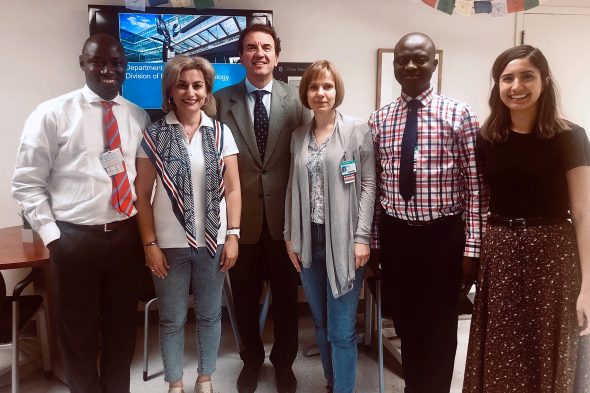Global transplant program welcomes international doctors to UIC
A team of doctors from around the globe is in Chicago to attend the 2nd GlobalBMT training course and learn more about blood and marrow transplant (BMT) from University of Illinois at Chicago specialists. The four doctors will spend eight weeks at UI Health, which is UIC’s clinical health enterprise, observing the transplant team, participating in planning meetings and attending patient rounds and lectures.
The doctors are from Greece, Nigeria and Ukraine. They are working with UIC’s Dr. Damiano Rondelli, the Michael Reese Professor of Hematology, chief of hematology/oncology and BMT, and founder of the GlobalBMT Program at the College of Medicine. The goal of the program, which is part of the college’s Department of Medicine and Center for Global Health, is to train physicians who want to develop transplant programs in their own low-middle-income countries.

“In Nigeria, there is no transplant program at all,” said Dr. Peter Ogundeji, from Ibadan, Nigeria. “But we have many patients who need it and many who can’t come to America.”
About 25% of adults in Nigeria have sickle cell disease, a type of anemia that causes extreme, lifelong pain and early death. Without a stem cell transplant — which UIC has helped to pioneer as a cure for the condition — people with sickle cell have limited treatment options.
Ogundeji and Dr. Abiola Bolarinwa, from Lagos, Nigeria, say they are in Chicago to learn how transplant programs in the U.S. work, so they can bring it to their patients. They need to “actually see it” to learn how to adapt it in their country, they said.
Currently, Ukraine only offers autologous stem cell transplants — those that use the patient’s own stem cells (versus donor stem cells) —to patients with blood cancer, such as lymphoma or myeloma.
“In Ukraine, there is not any transplant center performing donor-derived stem cell transplant in adult patients with leukemia or other blood cancers,” said Dr. Arina Martynchyk, who practices medicine in Kyiv. “Some travel abroad, but they seek for their follow-up care at home. It is a priority for us to learn how to best follow up with these patients and provide this service for the first time in the country.”
“Learning the different levels of support needed for transplants, seeing the standard operating procedures and understanding the structure of the team is very important,” said Dr. Eleftheria Hatzimichael, of Ioannina, Greece. She said there are some transplants happening in Greece, but not in Ioannina.
Hatzimichael is in Chicago thanks to an agreement between UIC and University of Ioannina, signed last year by UIC Chancellor Michael Amiridis and the chancellor in Ioannina.
“The constant support from Dr. Rondelli is the most important,” Hatzimichael said.
To date, UIC’s Global BMT Program has worked with nine countries in Asia, Africa and Europe to build or expand transplant programs.
Categories
Faculty, Health Sciences Colleges, UI Hospital
Topics
Global BMT Program, global health, hematology, oncology, sickle cell, UI Cancer Center
